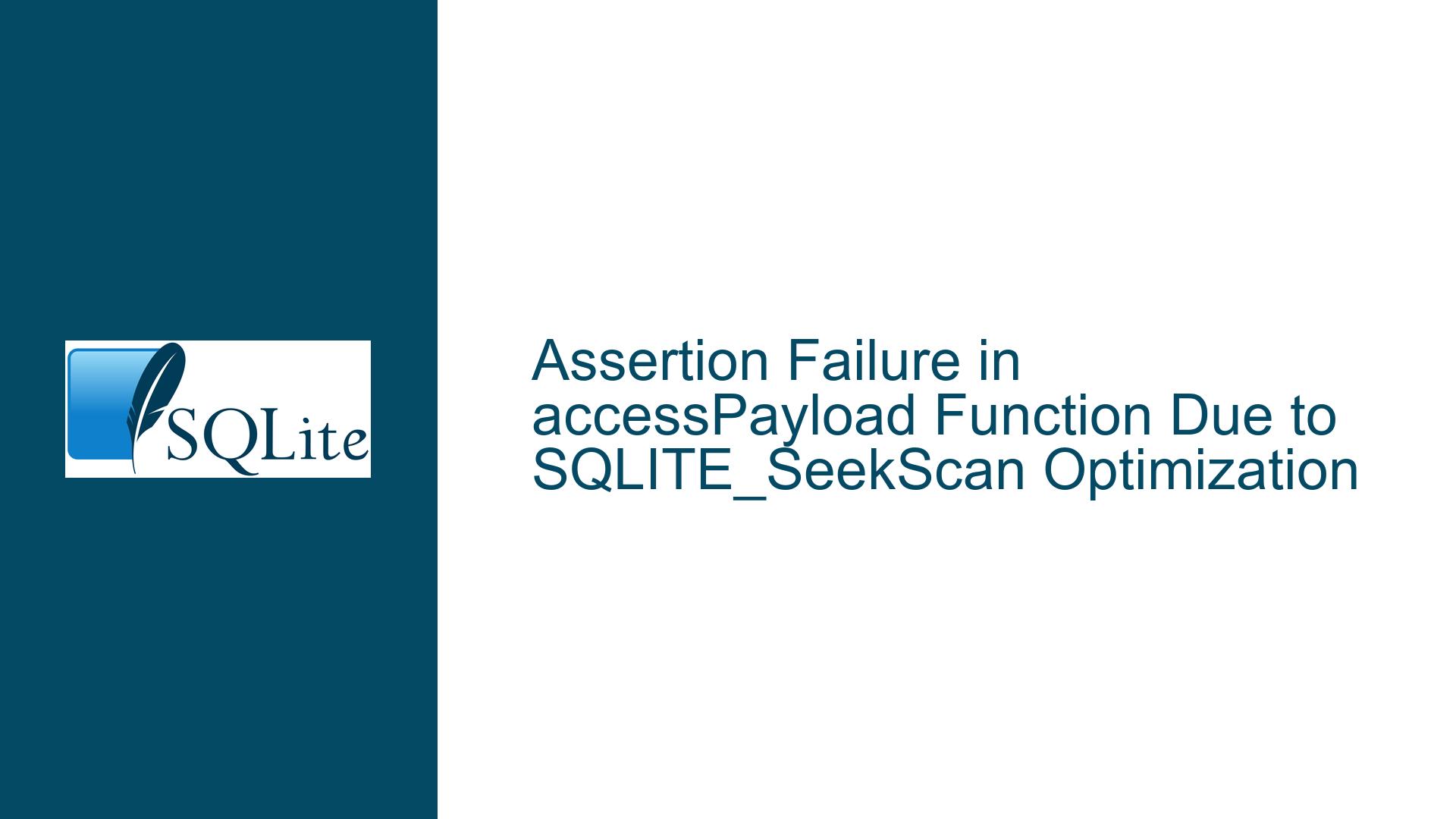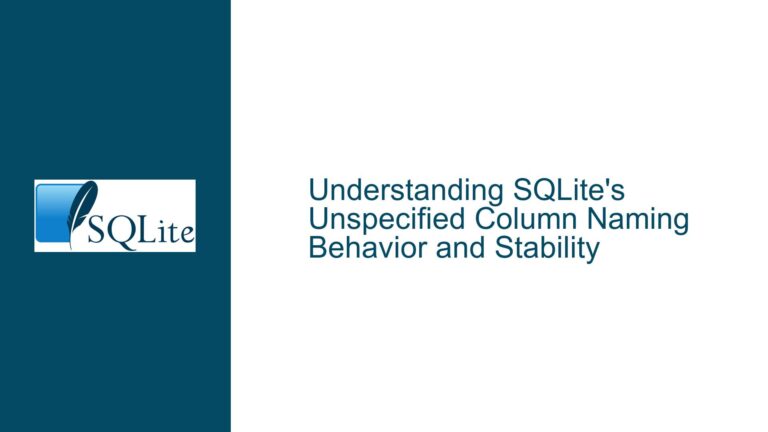Assertion Failure in accessPayload Function Due to SQLITE_SeekScan Optimization
Issue Overview: Assertion Failure in accessPayload Function During Query Execution
The core issue revolves around an assertion failure in the accessPayload function within SQLite, specifically when executing a query involving a SELECT statement with a max aggregation and an IN clause. The failure occurs in the context of a table v0 with a unique constraint on a single column c1, which is defined as TEXT. The table is populated with a mix of values, including a hexadecimal representation of a zero-filled blob (hex(zeroblob(241))) and integer literals (1, 2, 3). The failure is triggered during the execution of the query SELECT max(c1) FROM v0 WHERE c1 IN v0; after running ANALYZE to update the database statistics.
The assertion failure message indicates that the condition offset + amt <= pCur->info.nPayload is not satisfied within the accessPayload function. This function is part of SQLite’s B-tree module, which handles the retrieval of payload data from database pages. The failure suggests that the code is attempting to access a payload segment that exceeds the bounds of the available payload data for the current B-tree cursor (pCur).
The issue is closely tied to the SQLITE_SeekScan optimization, a feature designed to improve query performance by optimizing the way SQLite scans tables and indexes. When this optimization is enabled, SQLite crashes due to the assertion failure. However, disabling the SQLITE_SeekScan optimization (via .testctrl optimizations 0x00020000) allows the query to execute without issues. This behavior strongly suggests that the optimization is introducing a scenario where the payload access logic becomes invalid, leading to the assertion failure.
The problem was identified through a bisecting process, which pinpointed the issue to a specific commit range. The faulty behavior was introduced in commit 4a43430fd23f8835 and resolved in commit b95e69330eca0f45. The latter commit addresses the underlying cause of the assertion failure, ensuring that the accessPayload function operates correctly even when the SQLITE_SeekScan optimization is active.
Possible Causes: Misalignment Between Payload Access Logic and Optimization Behavior
The assertion failure in the accessPayload function can be attributed to a misalignment between the payload access logic and the behavior introduced by the SQLITE_SeekScan optimization. Several factors contribute to this misalignment:
Payload Size Miscalculation: The
accessPayloadfunction relies on thenPayloadfield of the B-tree cursor (pCur->info.nPayload) to determine the size of the payload data available for retrieval. The assertion failure indicates that the function is attempting to access a payload segment that exceeds this size. This suggests that thenPayloadvalue is either incorrect or not being updated properly when theSQLITE_SeekScanoptimization is active.Optimization-Induced Cursor State Changes: The
SQLITE_SeekScanoptimization may alter the state of the B-tree cursor in a way that invalidates the assumptions made by theaccessPayloadfunction. For example, the optimization might modify the cursor’s position or the way it traverses the B-tree, leading to scenarios where the payload size calculation becomes inconsistent with the actual data layout.Interaction with Unique Constraints and Data Types: The table
v0has a unique constraint on thec1column, which is defined asTEXT. The presence of a unique constraint can influence how SQLite stores and retrieves data, particularly when dealing with mixed data types (e.g., hexadecimal strings and integers). TheSQLITE_SeekScanoptimization might not account for these nuances, leading to incorrect payload access patterns.Impact of ANALYZE on Query Planning: Running
ANALYZEupdates the database statistics, which can affect the query planner’s decisions. The combination of updated statistics and theSQLITE_SeekScanoptimization might result in a query plan that exposes the payload access issue. WithoutANALYZE, the query planner might choose a different execution strategy that avoids the problematic scenario.Edge Case in Payload Access Logic: The specific combination of a large hexadecimal string (
hex(zeroblob(241))) and integer literals in the table data might trigger an edge case in the payload access logic. TheSQLITE_SeekScanoptimization could exacerbate this edge case, leading to the assertion failure.
Troubleshooting Steps, Solutions & Fixes: Addressing the Assertion Failure and Ensuring Robust Query Execution
To resolve the assertion failure and ensure robust query execution, the following steps and solutions can be implemented:
Disable SQLITE_SeekScan Optimization: As a temporary workaround, the
SQLITE_SeekScanoptimization can be disabled using the.testctrl optimizations 0x00020000command. This prevents the optimization from altering the cursor state in a way that triggers the assertion failure. However, this approach sacrifices the performance benefits of the optimization and should only be used as a stopgap measure.Update to a Fixed Version of SQLite: The issue has been resolved in commit
b95e69330eca0f45. Updating to a version of SQLite that includes this commit ensures that theaccessPayloadfunction operates correctly even when theSQLITE_SeekScanoptimization is active. This is the recommended long-term solution, as it addresses the root cause of the problem without requiring any changes to the application code or database schema.Review and Adjust Compilation Flags: The compilation flags used to build SQLite can influence its behavior. In this case, the flags
-DSQLITE_DEBUG,-DSQLITE_ENABLE_TREETRACE,-DSQLITE_ENABLE_WHERETRACE,-DSQLITE_ENABLE_CURSOR_HINTS,-DSQLITE_COUNTOFVIEW_OPTIMIZATION, and-DSQLITE_ENABLE_STAT4are enabled. While these flags are useful for debugging and performance tuning, they might interact with theSQLITE_SeekScanoptimization in unexpected ways. Reviewing and adjusting these flags can help identify and mitigate potential issues.Validate Payload Access Logic: The
accessPayloadfunction should be reviewed and validated to ensure that it correctly handles all possible cursor states and payload sizes. This includes verifying that thenPayloadfield is updated accurately and that the function’s bounds-checking logic is robust. Any discrepancies or edge cases should be addressed to prevent similar assertion failures in the future.Test with Diverse Data Sets: The issue was triggered by a specific combination of data types and values (e.g., hexadecimal strings and integers). Testing the database with a diverse range of data sets can help identify other potential edge cases and ensure that the payload access logic and optimizations work correctly in all scenarios.
Monitor Query Plans and Execution: The query planner’s decisions can significantly impact the behavior of the database. Monitoring the query plans generated by SQLite, particularly when the
SQLITE_SeekScanoptimization is active, can provide insights into how the optimization interacts with the payload access logic. Adjusting the query plan or adding hints can help avoid problematic scenarios.Contribute to SQLite Development: If the issue persists or new related issues are discovered, contributing to the SQLite development process can help improve the database’s robustness. This includes reporting bugs, submitting patches, and participating in discussions on the SQLite forum or mailing list.
By following these steps and solutions, the assertion failure in the accessPayload function can be effectively addressed, ensuring stable and efficient query execution in SQLite.






